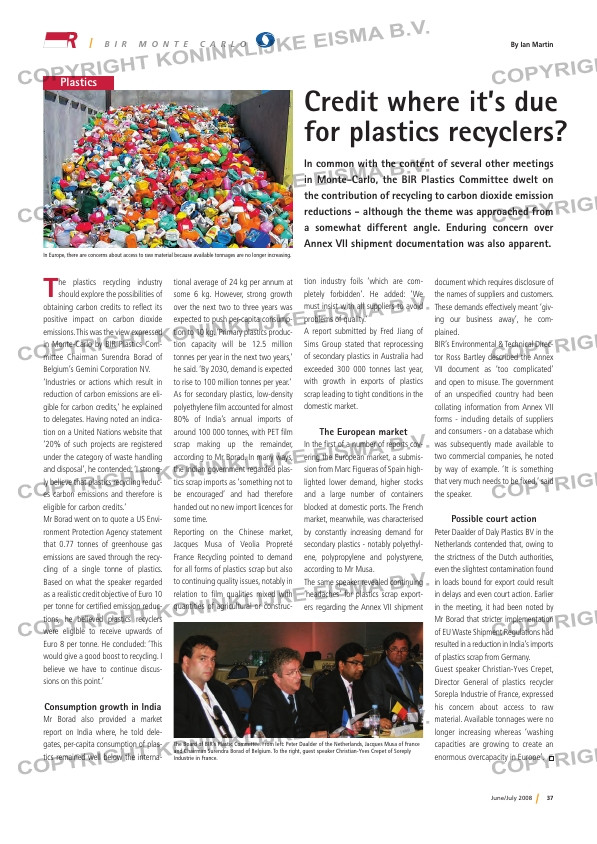Page 37 from: June / July 2008

37June/July 2008
B I R M O N T E C A R L O By Ian Martin
The plastics recycling industry should explore the possibilities of
obtaining carbon credits to reflect its
positive impact on carbon dioxide
emissions. This was the view expressed
in Monte-Carlo by BIR Plastics Com-
mittee Chairman Surendra Borad of
Belgium’s Gemini Corporation NV.
‘Industries or actions which result in
reduction of carbon emissions are eli-
gible for carbon credits,’ he explained
to delegates. Having noted an indica-
tion on a United Nations website that
‘20% of such projects are registered
under the category of waste handling
and disposal’, he contended: ‘I strong-
ly believe that plastics recycling reduc-
es carbon emissions and therefore is
eligible for carbon credits.’
Mr Borad went on to quote a US Envi-
ronment Protection Agency statement
that 0.77 tonnes of greenhouse gas
emissions are saved through the recy-
cling of a single tonne of plastics.
Based on what the speaker regarded
as a realistic credit objective of Euro 10
per tonne for certified emission reduc-
tions, he believed plastics recyclers
were eligible to receive upwards of
Euro 8 per tonne. He concluded: ‘This
would give a good boost to recycling. I
believe we have to continue discus-
sions on this point.’
Consumption growth in India
Mr Borad also provided a market
report on India where, he told dele-
gates, per-capita consumption of plas-
tics remained well below the interna-
tional average of 24 kg per annum at
some 6 kg. However, strong growth
over the next two to three years was
expected to push per-capita consump-
tion to 10 kg. ‘Primary plastics produc-
tion capacity will be 12.5 million
tonnes per year in the next two years,’
he said. ‘By 2030, demand is expected
to rise to 100 million tonnes per year.’
As for secondary plastics, low-density
polyethylene film accounted for almost
80% of India’s annual imports of
around 100 000 tonnes, with PET film
scrap making up the remainder,
according to Mr Borad. In many ways,
the Indian government regarded plas-
tics scrap imports as ‘something not to
be encouraged’ and had therefore
handed out no new import licences for
some time.
Reporting on the Chinese market,
Jacques Musa of Veolia Propreté
France Recycling pointed to demand
for all forms of plastics scrap but also
to continuing quality issues, notably in
relation to film qualities mixed with
quantities of agricultural or construc-
tion industry foils ‘which are com-
pletely forbidden’. He added: ‘We
must insist with all suppliers to avoid
problems of quality.’
A report submitted by Fred Jiang of
Sims Group stated that reprocessing
of secondary plastics in Australia had
exceeded 300 000 tonnes last year,
with growth in exports of plastics
scrap leading to tight conditions in the
domestic market.
The European market
In the first of a number of reports cov-
ering the European market, a submis-
sion from Marc Figueras of Spain high-
lighted lower demand, higher stocks
and a large number of containers
blocked at domestic ports. The French
market, meanwhile, was characterised
by constantly increasing demand for
secondary plastics – notably polyethyl-
ene, polypropylene and polystyrene,
according to Mr Musa.
The same speaker revealed continuing
‘headaches’ for plastics scrap export-
ers regarding the Annex VII shipment
document which requires disclosure of
the names of suppliers and customers.
These demands effectively meant ‘giv-
ing our business away’, he com-
plained.
BIR’s Environmental & Technical Direc-
tor Ross Bartley described the Annex
VII document as ‘too complicated’
and open to misuse. The government
of an unspecified country had been
collating information from Annex VII
forms – including details of suppliers
and consumers – on a database which
was subsequently made available to
two commercial companies, he noted
by way of example. ‘It is something
that very much needs to be fixed,’ said
the speaker.
Possible court action
Peter Daalder of Daly Plastics BV in the
Netherlands contended that, owing to
the strictness of the Dutch authorities,
even the slightest contamination found
in loads bound for export could result
in delays and even court action. Earlier
in the meeting, it had been noted by
Mr Borad that stricter implementation
of EU Waste Shipment Regulations had
resulted in a reduction in India’s imports
of plastics scrap from Germany.
Guest speaker Christian-Yves Crepet,
Director General of plastics recycler
Sorepla Industrie of France, expressed
his concern about access to raw
material. Available tonnages were no
longer increasing whereas ‘washing
capacities are growing to create an
enormous overcapacity in Europe’.
Credit where it’s due
for plastics recyclers?
In common with the content of several other meetings
in Monte-Carlo, the BIR Plastics Committee dwelt on
the contribution of recycling to carbon dioxide emission
reductions – although the theme was approached from
a somewhat different angle. Enduring concern over
Annex VII shipment documentation was also apparent.
Plastics
In Europe, there are concerns about access to raw material because available tonnages are no longer increasing.
The Board of BIR’s Plastic Committee. From left: Peter Daalder of the Netherlands, Jacques Musa of France
and Chairman Surendra Borad of Belgium. To the right, guest speaker Christian-Yves Crepet of Soreply
Industrie in France.
RI_013 BIR Plastics.indd 37 19-06-2008 11:16:46



